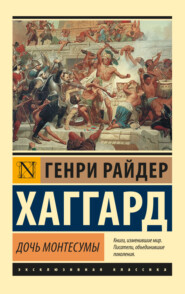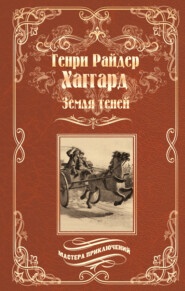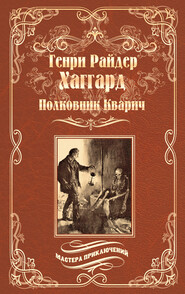По всем вопросам обращайтесь на: info@litportal.ru
(©) 2003-2024.
✖
Belshazzar
Настройки чтения
Размер шрифта
Высота строк
Поля
Then Pharaoh lifted his sceptre and there was silence.
Atyra drew near in all her scented beauty, with bent head and downcast eyes. Yet for one instant those dark eyes were lifted and I felt rather than saw them flash a look upon me, saw also the red lips tremble as though with a little smile. I think that Belus saw also, for I heard a groan come from where he stood near by in attendance on me. The queen mounted the royal dais and curtseyed low, though prostrate herself she did not because she was a majesty greeting a majesty. Pharaoh descended from his throne and taking her hand, led her to a seat that was placed near though slightly lower than this throne.
Then she spoke – in Greek which by now had become the courtly language among many nations that did not know each other’s speech. An interpreter began to render her words, but Apries, waving him aside, answered her in the same tongue which he knew as well as he did his own, having learned it from my mother and others. This caused many of the Egyptians round him to frown, especially those that were old or wedded to ancient ways which had come down to them through thousands of years, who hated the Greeks with their new fashions, their language and all that had to do with them. Indeed I noted that even Amasis frowned and shrugged his shoulders and that the other Egyptian generals looked on him with approval as he did so.
As for the talk between Atyra and Pharaoh, it need not be set out. She made a formal prayer to him, reminding him of the ancient friendship between the Syrians and Egypt that more than once during the generations which had gone by, had been their over-lord, yes, from the time of the great Thotmes onward, though sometimes they had quarrelled “as a wife will, even with the husband whom she loves.” Now she, the widow of Abibal who had been the head king of the Syrian peoples and who had died leaving his mantle upon her shoulders, came to seek renewal of that alliance, even though Syria must thus once more become the wife of Egypt and serve as a wife serves.
Here Pharaoh asked shrewdly if this wife sought to shun the arms of some other lover, whereon she answered with boldness, “yes,” that this was so and that the name of that lover was Babylon, Egypt’s ancient enemy and the one from whom she had most to fear.
Now Pharaoh grew grave, saying that this was a very great matter of which he must consider with himself and his councillors, after private talk with her. Then dismissing all such affairs of state, he asked her how it had fared with her during her long journey, from which he hoped that she would rest a while here in his palace at Sais, treating it as her own. She answered that she desired nothing better, who all her life had hoped to visit Egypt and acquaint herself with its wonders and its wisdom.
So this prepared and balanced talk went on, reminding me of a heavy weight swinging to and fro, and never going further or less far, till at length Pharaoh bade her to a banquet that night. Then, as though by an afterthought, he added,
“O Queen Atyra, the other day I sent Ramose, a young Count of Egypt in whom runs no mean blood, to your camp to welcome you in Egypt’s name. I grieve to hear that while he was there a quarrel arose between him and one of your followers, and for this I ask your pardon.”
“There is no need, Pharaoh,” she answered smiling, “seeing that in every quarrel there is something to be said on either side.”
“Then, Queen Atyra, if you can forgive him, would it please you that while you are here I should appoint this Ramose who stands yonder, to be your chamberlain to attend upon your wants and bear your wishes to me? Or would you prefer that I should choose some older man to fill this office?”
“I think that it would please me well,” she answered indifferently, “seeing that I found the Count Ramose a pleasant companion and one with whom I could talk in Greek; also one who can instruct me in the customs and history of Egypt and in its tongue, all of which I desire to learn. Yet let it be as the Pharaoh wills. Whoever Pharaoh chooses will be welcome to me.”
So saying, she turned her head to speak to one of her servants in her own language, as though the matter troubled her not at all.
“Count Ramose,” said Pharaoh, addressing me, “for the days of her stay at our court we give this royal lady into your keeping. Let it be your duty to wait upon her and to attend to her every want, making report to us from time to time of how she fares. Know, Ramose, that we shall hold you to strict account for her safety and her welfare and that if aught of ill befalls her while she is in your keeping, you shall make answer for it to us.”
Thus in formal, stately words was the lady Atyra set in my charge. I heard and bowed, while the other courtiers looked on me with envy, for this was a great duty and one that should bring with it advancement and rewards. Yet it is true that as I bowed my heart, which should have leapt for joy, seemed to sink and fail so that I could scarcely feel it beat. It was as though some icy hand of fear had gripped it by the roots. A great terror took hold of me, a shadow of woe to come fell upon me. Almost I determined to prostrate myself and pray Pharaoh to confer this honour on some other man, one with more knowledge and older. I even turned to advance to the steps of the throne and do so, although I knew that such a prayer would cause me to be mocked by all the court. It was too late, Pharaoh had risen; his decree was written on the rolls, the audience was at an end.
Now I will press on with the terrible story of Atyra which was to turn the current of my life and for aught I know, robbed me of the throne of Egypt. At least so Belus held, as did some others, though if so, that is a loss over which I do not grieve.
For a while all went well. I waited on the queen; with her officers I was her companion at her table; I instructed her as best I might in all she wished to learn, for to me alone she would listen and not to Belus or another. When she visited Pharaoh and his councillors I accompanied her, standing back so that I might not overhear their secrets. In short I did all those things I had been instructed to do, even to make report of everything I learned from the queen as I had been bidden.
One day she turned on me laughing and said,
“I thought you were my friend, Ramose, but I find that you are nothing but a spy who repeats to Pharaoh all I say. I know it because he used to me some of my very words, thinking that they were his own, which words could only have come to him through you.”
Now I turned aside and hung my head, whereon she leant over me, whispering,
“Foolish boy, do not think I am angry with you, who know well that you must do your duty and therefore tell you nothing that you may not cry out from every pylon top. These matters of policy are between me and Pharaoh, or rather between Syria and Egypt. I and you have others to discuss that Pharaoh would think dull. Now tell me of your boyhood and of the woman that you first thought fair.”
So it went on and ever as I drew back, so she came forward. At first I think that she was puzzled who could not understand why I resisted her and made search to find some other woman who had built a wall between us. Soon she discovered that there was none; indeed she drew this out of me. At last in a flash she guessed the truth – that I was under an oath, to my own heart or another, which, mattered not, to treat her as a queen who was Egypt’s guest, and no more.
Then Atyra did what she should not have done, as doubtless she knows today. She set herself to make me break that oath. For nothing else do I blame her who, I know, loved me truly, boy though I was. But for this, how can she escape from blame? She knew that her witchery was on me, she knew that she had made me mad – indeed in those days of resistance I went near to madness, I who worshipped her as a thing divine, and yet she put out all her woman’s strength to break my will and cause me to forswear myself.
At last the matter came to a head, as such do always. The feast was over, the guests had departed, I presented myself, as I must, to take my farewell of her for the night, and found that I was alone with her in the little antechamber where a single lamp burned dimly. She was standing at a window-place cut in the thickness of the wall, watching the rising of the moon, a figure clad all in white, but for some scarlet pomegranate blooms fastened upon her breast, for her maids had relieved her of her royal ornaments, save a girdle of gold about her waist.
Discovering her at length I advanced to inquire her commands for the morrow, bow and be gone.
“How quietly you walk, Ramose,” she said. “I heard you not, yet I knew that you were coming. Yes, I felt your presence, as we do that of those whom we love – or hate. My orders? Oh! I have none to give you at the moment, young chamberlain. Why think of the morrow on such a night as this. Look at that great moon rising yonder out of the desert. No wonder that you Egyptians set your Isis in the moon, for it is a lovely throne fit for any goddess. Now of what does this one put me in mind? Ah! I remember – of that which rose over the waters of the Nile when you and I sat together in a ruined temple of the desert. Do you not remember it?”
I muttered some answer, I know not what it was, and half-turned to go, when with a swift and sudden motion she flung herself against me. Yes, from her foot to her shoulder I felt all the weight of her beautiful body leaning against me.
I never stirred, I did nothing, and yet I know not how, presently her lips were on my own.
She drew away, laughing low and happily, and asked,
“Now, Ramose, do you remember that night in the ruined temple when we looked together at the moon rising over the Nile?”
I fled away, and as I fled, still she laughed.
It was after this that for the first time I saw the priest Ninari among the other servitors of the queen, recovered of his wounds but wearing a cap with lappets that hung down over his ears. He greeted me courteously enough, but in his eyes was a fierce look that I could not misunderstand.
“We quarrelled once, young lord,” he said, “but now that you are the appointed guardian of my queen, we are friends, are we not?”
“Surely,” I answered.
“Then all is well between us, young lord, while you guard her faithfully, who otherwise may quarrel once more and with a different ending.” And again he smiled upon me with those fierce eyes and was gone.
On the evening of my meeting with Ninari, I was in waiting on Queen Atyra in the garden of which I have written, and noted that she was troubled. Presently she led me to a seat beneath the palms in front of which lay the little pool where flowered the blue lotus lilies. It was a pleasant, secluded seat hidden from the rest of the garden and from the palace windows by a bank of flowering shrubs and of tall reed-like plants with feathery heads.
“What ails you?” I asked.
“Everything, Ramose,” she answered. “All goes awry and I would that I were dead. My mission to Pharaoh is ended, and not so ill. To-morrow at the dawn the Egyptian general Amasis, with a great force most of which has gone on before, advances to attack the Babylonians on the borders of Egypt. To-morrow also I leave Sais to journey back to my own country. It was decided but an hour ago. Do you understand that I leave Sais?”
“I understand, Queen, though this sudden plan amazes me. Why do you go so swiftly?”
“I will tell you. Ninari has been with Pharaoh and has told him that news has come from my country that those who are left in power there, urged on by the people who are afraid, threaten to make peace with Babylon, and that one of the terms of that peace will be that we Syrians should join the Babylonians in the attack on Egypt. He has told him also that there is but one hope of defeating this treachery, namely, that I should return at once bearing Pharaoh’s offers of alliance, and as the wife of Ninari who alone can control the priesthood, which is the real power in the land, and overthrow this plot.”
“As the wife of Ninari,” I gasped. “May the gods avert it!”
“The gods make no sign, Ramose. If there be any gods, these ask of men that they should carve their own fate upon the cliffs of Time. In this matter Ninari is the god.”
For a little while we sat silent staring at the lotus blooms. Then she spoke again.
“Do you love me, Ramose?”
“You know that I love you,” I answered.
“Yes, yet your love is to my love but as a dewdrop to the waters in that lake. Ramose, a madness has taken hold of me. I will tell you the truth. You are very young and as yet of small account in the world, while I am a queen who perchance will become the sovereign of a great country, if with Egypt’s help we can overthrow Babylon, as may happen now that Nebuchadnezzar grows old and feeble and there is none to take his place. Still I say to you that you, the son of Pharaoh’s woman, are more to me than all earth’s thrones and glory. Here fate thrusts me on, not folly or passion, but fate itself with an iron hand. I will have none of Ninari. Rather than that accursed priestly hound should creep into my chamber, I will die, or better still, he shall die who knows not with whom he has to deal. Yes, here and now I pronounce his doom.”
Thus she spoke in slow, cold words that yet were full of fearful menace, then suddenly went on in a soft, changed voice.
“Let us talk no more of this foul Ninari. Hearken! If you will play the man I have plans that shall make of you a great king and give to you one of earth’s fairest and most loving women as a wife. But I, who perhaps have said too much already, dare not speak them here. Always I am watched, the very air seems to play the spy upon me, and even now I feel – ” and she shivered. “Moreover my women wait to tire me for Pharaoh’s farewell feast and I must be gone. Ramose, you have the key of the door that leads to my chambers. In the first of them I sleep quite alone, for I will have no one near me in my slumbers and the guards and eunuchs are set far away beyond. Come to me at midnight and I will tell you all. Will you come, knowing that if aught miscarries, your life hangs in it?”
“My life,” I answered sadly. “What is my life? Something of which I think I should be well rid could I say good-bye to it with honour. I have not been happy of late, Queen Atyra. Pharaoh laid a charge upon me and, forgive me for saying it, it seems that always you have put out your strength to cause me to break my trust. By Amen I have fought my best, but alas! I am weak with love of you. When your eyes shine upon me I grow dizzy and at your touch my purpose melts like wax in the midday sun. What you command, that I must do and if death waits at the end of your road, may Thoth, the Weigher of hearts, be merciful and give me sleep that I may forget my shame.”
She looked at me and there was pity in her eyes. Then the pity passed and they burned with the light of passion.
“I grieve for you as I grieve for myself, whose danger is greater than your own,” she said. “Yet for me the choice lies between you and madness. Know, Ramose, that without you I shall go mad, and ere I die work woes at which the world will shudder. Think! is such a love as mine a gift to be lightly cast away?”

















